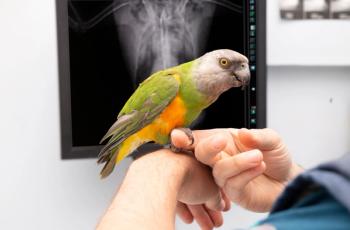
Bringing zoo medicine to the forefront

Dr Proença encourages veterinary professionals to be confident when caring for zoo exotic pets in her keynote presentation at the Fetch conference in Long Beach, California
“What I'm going to try to show you today is that each and every one of you in this room, is already a zoo med doctor, is already an exotic doctor…I prefer to call ourselves zoo med professionals: technicians, assistants, doctors. You know why we are all zoo med doctors? Because we know the same medicine, it is the same medicine, it's all the same. And I'm going to prove it to you today,” Laila "Lyla" M. Proença MV, DVM, MS, PhD, DACZM, founder and CEO of VetAhead told attendees during her keynote session at the Fetch dvm360 conference in Long Beach, California.1 Her goal of the talk was to decrease the anxiety and apprehension surrounding exotic pets and encourage every veterinary professional to feel comfortable treating an animal that is not a dog or cat. This can start with using the term zoo med rather than exotic medicine, because Proença said that the word exotic gives a different, separate, and intimidating connotation.
In Proença’s opinion, she said, exotic makes these pets seem even more different than dogs and cats, and her objective is to make everyone see them as the same. “You don't need a separate room. You don't need a separate technician. You don't need a separate department,” she added. Proença recommended keeping ZooMed pets in the same area of the hospital as dogs and cats, while still maintaining normal safety protocols.
Standard of care
Some might say 'why bother learning how to treat pets like fish, ferrets, rabbits, hamsters, guinea pigs, gerbils, turtles, snakes, lizards, birds, etc? Most households in the United States own dogs.' However, Proença argued that there is still a good amount of ZooMed pet owners, and they also need veterinary care and if no one is willing to help them, then these animals cannot get the medical attention they need. “I think sometimes we forget how capable humans are to form bonds with any animal, not just dogs and cats,” Proença stated.
As an example, Proença shared a story of a hamster that came to her open-mouth breathing. To help assess and treat the patient try this: “Instead of saying hamster say dog, you have a dog patient. Okay, a dog that comes to you with an open mouth breathing, what are the differentials, what is the medical approach?” The standard of care for a dog in this condition is NOT administering subcutaneous fluids, oxygen, enrofloxacin. “You know the differentials for open mouth breathing include heart disease, and this is exactly what this hamster had, congestive heart failure. Fluids would make it worse and enrofloxacin would do nothing. Remember, it could be primary respiratory, but can be secondary [too],” Proença said.
With the hamster patient, she heard a heart murmur. Bloodwork, X-rays, and echocardiograms can also be used on hamsters, and that is what she did. Proença’s point was that all of these diagnostic tools can be used for a hamster and any other species. Veterinary professionals are already equipped with handling ZooMed cases because they already know how to handle other small animal cases.
Another case for Proença involved an Aldabra tortoise that came in with a missing arm and the owner did not know what happened. Working with Mariana Pardo, MV, BVSc, DACVECC, the veterinary pair took a blood sample and found the packed cell volume was 2%. “We looked at each other, [and said], ‘What are we going to do?’ And [Pardo] looked at me and said, ‘You know, if he was a dog, I would do a blood transfusion.’ And I was like, you're probably right. I was like, okay but where are we going to get the blood? And she [said], ‘Well, if it was a dog, I would ask the owner if they have another dog.’ Smart. And the owner did have another one, so they brought it in, and we collected blood, diluted the same way you guys dilute the dog and cat blood. And then we place a central line—in this case it could have been an IV catheter, but we were fancy.”
Client spending
Proença has convinced attendees of these pets’ existence and their importance, but how do these professionals get compensated? Proença shared a survey from 2017 that researched spending habits in US pet households.2 The data found that:
- Rabbit owners
- 66.9% spend up to $500 per household per year on veterinary care.
- 20.6% spent $500‐$1,000/year.
- 9.6% spent $1,000‐$3,000/year.
- 3.2% spent more than $3,000/year.
- Dog owners
- on average, they spend $537/year on veterinary care.
- 13% spent $1,000 or more.
- Cat owners
- on average, they spend $558/year.
“When it comes to a tortoise or turtle, we [often think], ‘oh no, I am not going to offer this diagnostics/treatments it's so expensive.’ Some tortoises can live to 100 years. You think the owner is not going to pay for it? It has been with the pet for so long,” Proença said.
Parting words
Proença left attendees with one more reminder: “I want you to join the movement, which is no species left behind. I want you to start spreading the news that ZooMed is nothing but the medicine you already practice…We’re going to make ZooMed accessible.”
References
- Proença L. Pushing the Boundaries on the Standard of Care in ZooMed (Exotic Animal Medicine). Presented at: Fetch dvm360 conference; Long Beach, California; December 1-3, 2023.
- Mayer J, Brown S, Mitchell MA. Survey to investigate owners׳ perceptions and experiences of pet rabbit husbandry and health. Journal of Exotic Pet Medicine, 2017. 26(2), 123‐131.
Newsletter
From exam room tips to practice management insights, get trusted veterinary news delivered straight to your inbox—subscribe to dvm360.




